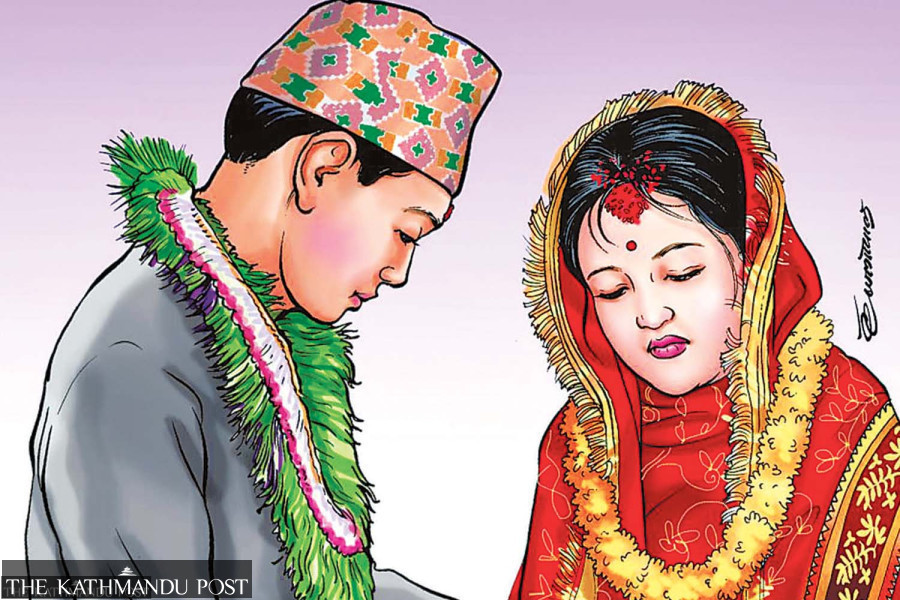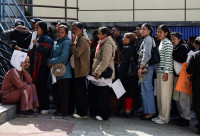National
UN panel backs Nepal’s plan to relax marriage age bar
Country is already working to relax marriage-related laws. Rights activists call CEDAW’s suggestion regressive.
Binod Ghimire
The United Nations Committee on the Elimination of Discrimination against Women (CEDAW) has recommended the Nepal government to lower the current minimum age for marriage even as the government is working to relax some legal provisions related to marriage.
Presenting its concluding observations on Nepal’s seventh periodic report, CEDAW suggested that Nepal lower the minimum marriage age from 20 years to 18 years. “Set the minimum age of marriage at 18 years for both girls and boys,” reads one recommendation, further suggesting the government to harmonise the National Strategy on Ending Child Marriage with the National Action Plan to End Child Marriage 2018-2030, as defined by the Covention on the Rights of the Child (CRC) and accede to 1962 Convention on Consent to Marriage.
CEDAW’s recommendation is in line with the years-long government preparation to revise the minimum age, although Nepal had not made any such proposal in its seventh cycle report submitted to the UN committee.
Rights activists say the recommendation is regressive and claim that it is wrong to cite the child rights convention to recommend a lower marriage age. “The CRC only defines who are children, and the harmful practices,” Laxmi Pokharel, a human rights lawyer, told the Post. “Each country is free to decide the minimum marriage age based on its context. It is unfortunate of the committee to make such a recommendation.”
However, Bandana Rana, a CEDAW member representing Nepal, argues that she had not participated in any meetings that discussed the Nepal issue, citing conflict of interest. “To my knowledge, the recommendations were made based on the existing international instruments and practices in different countries,” she told the Post.
The minimum age for marriage in most states in the US, for instance, is 18 years. The same is the case in the United Kingdom. In India, the groom should be of 21 and the bride 18, to be eligible for marriage. Reacting to the criticism by activists, Rana says, “That’s just a recommendation. Nepal is free to decline it.”
However, Nepal has already initiated a process to revise existing laws. The bill to revise the Child Act and the Criminal Code to relax the marriage-related provisions is under the Cabinet’s consideration. “It is being discussed at the Cabinet’s Social Committee,” Man Bahadur Aryal, joint secretary at the Ministry of Law, Justice and Parliamentary Affairs, told the Post. “The revisions are inspired by the Romeo & Juliet law.”
For instance, if a boy and a girl are over 18 but not yet 20, they will not be booked for a criminal offence. They will instead be released on the condition that they formally get married after reaching 20.
The Romeo & Juliet law, which is in practice in various states in the US, envisions creating an exception to statutory rape for two young people who do not have a large age gap. For instance, if the minimum age for marriage is 18, there can be consensual sex between the partners who do not have an age gap of more than two or three years. If an 18-year-old boy has consensual sex with a 15-year-old girl, it is not taken as rape as per the law.
The Criminal Code says a marriage is concluded or caused to be concluded only when the two parties have attained 20 years of age. “A person who flouts the law shall be liable to a sentence of imprisonment for a term not exceeding three years and a fine not exceeding Rs30,000,” says section 173 of the code.
Similarly, Criminal Procedure Code 2017 states that establishing a sexual relationship with a girl under 18 years of age, even with her consent, constitutes rape. As a result, hundreds of boys who have a love marriage or a marriage in consent with girls below 18 have been charged with child marriage and rape.
Nepal expects such cases to decline once the revised laws come into force.
Preparations to revise the legal provisions had started in 2022 when Govinda Koirala Bandi was the law minister who argued that there was no point in having 20 years as the minimum age for marriage while one gets citizenship at 16 and can cast a vote at 18.




 20.9°C Kathmandu
20.9°C Kathmandu














